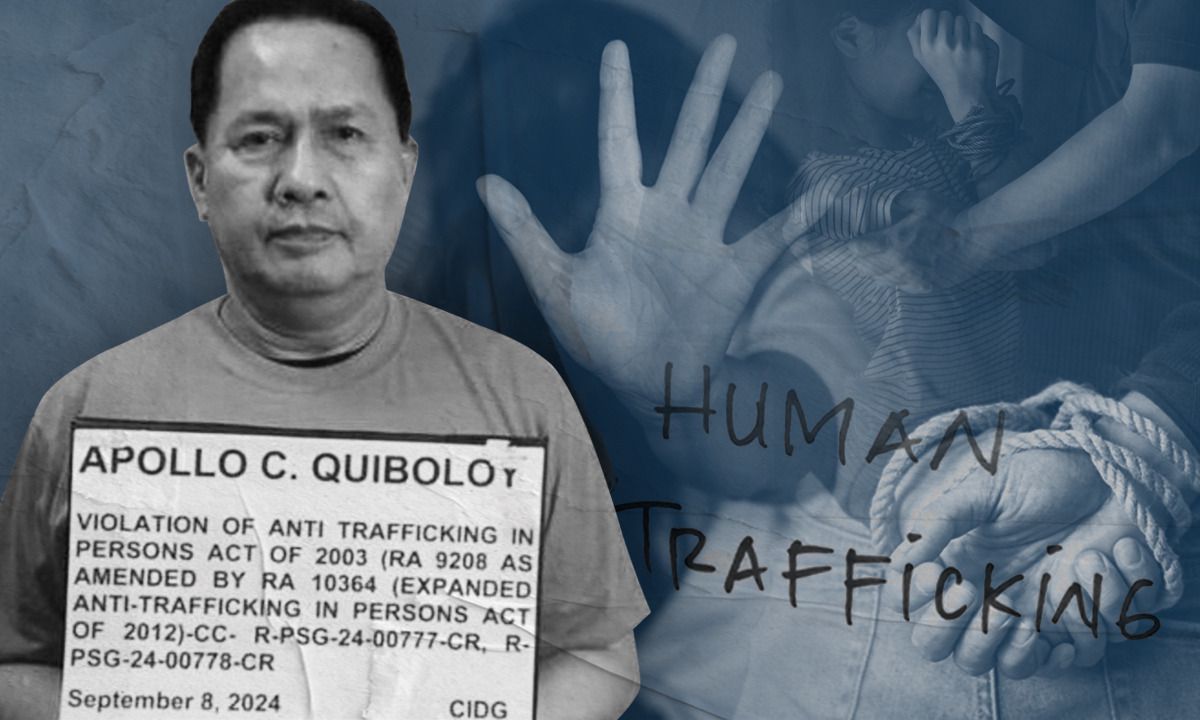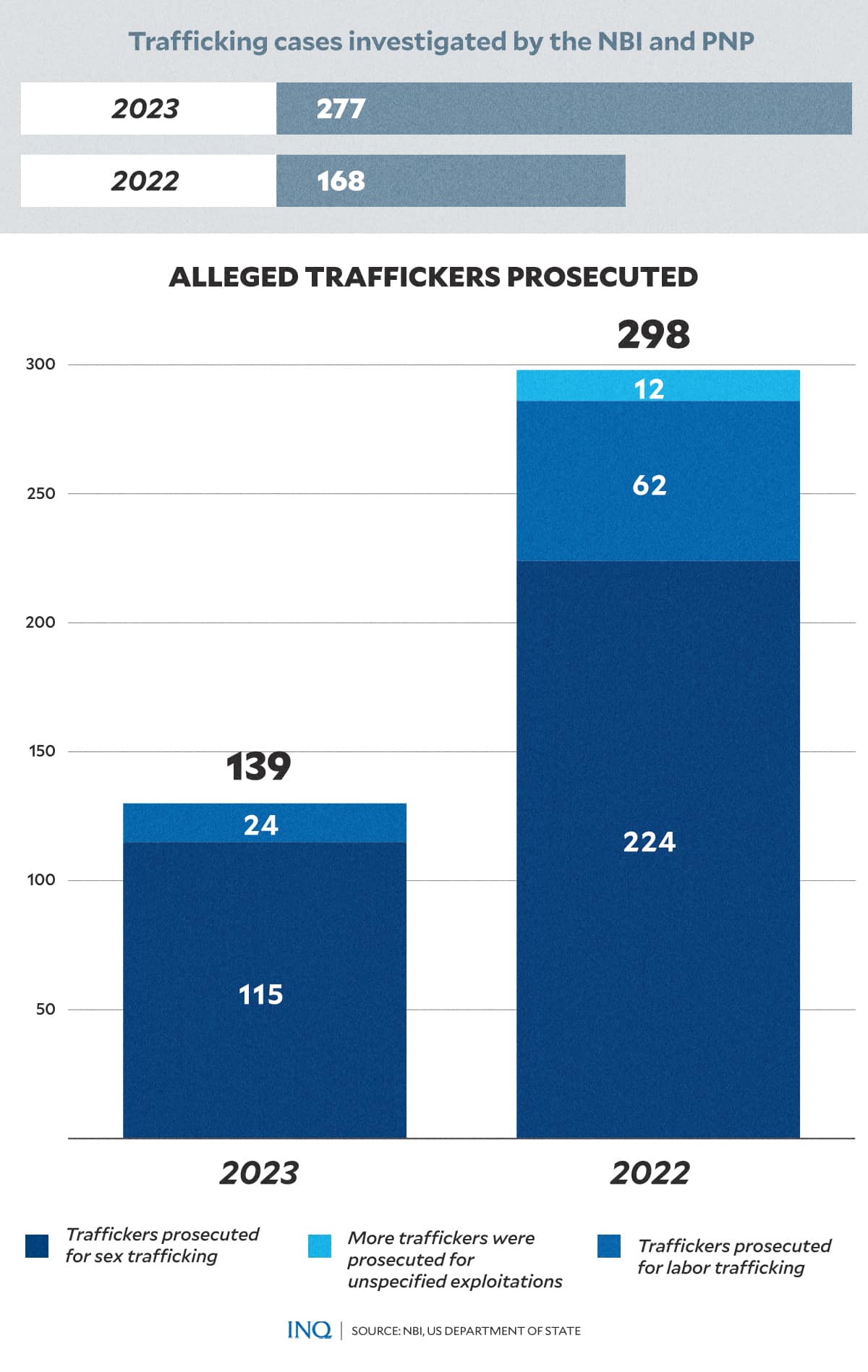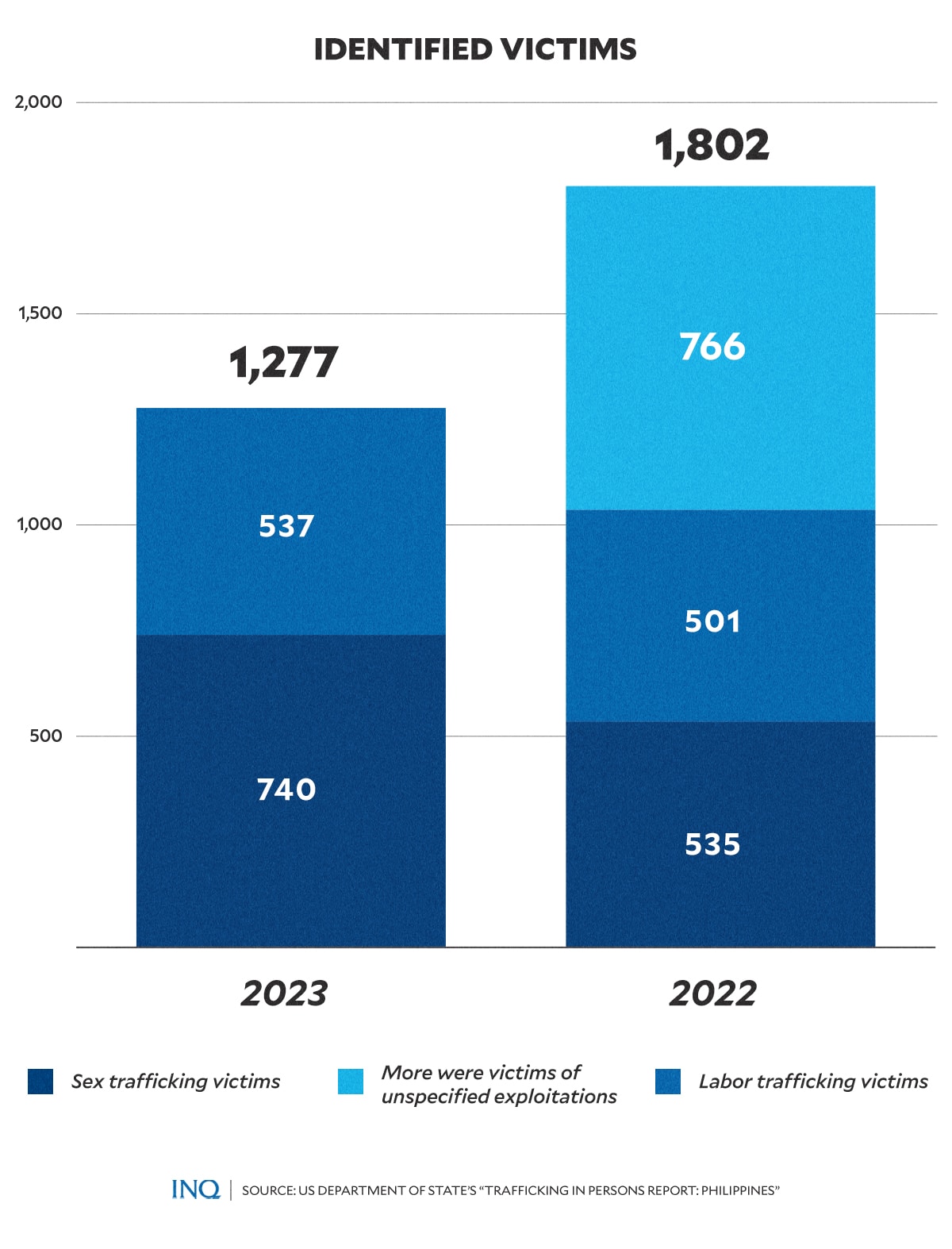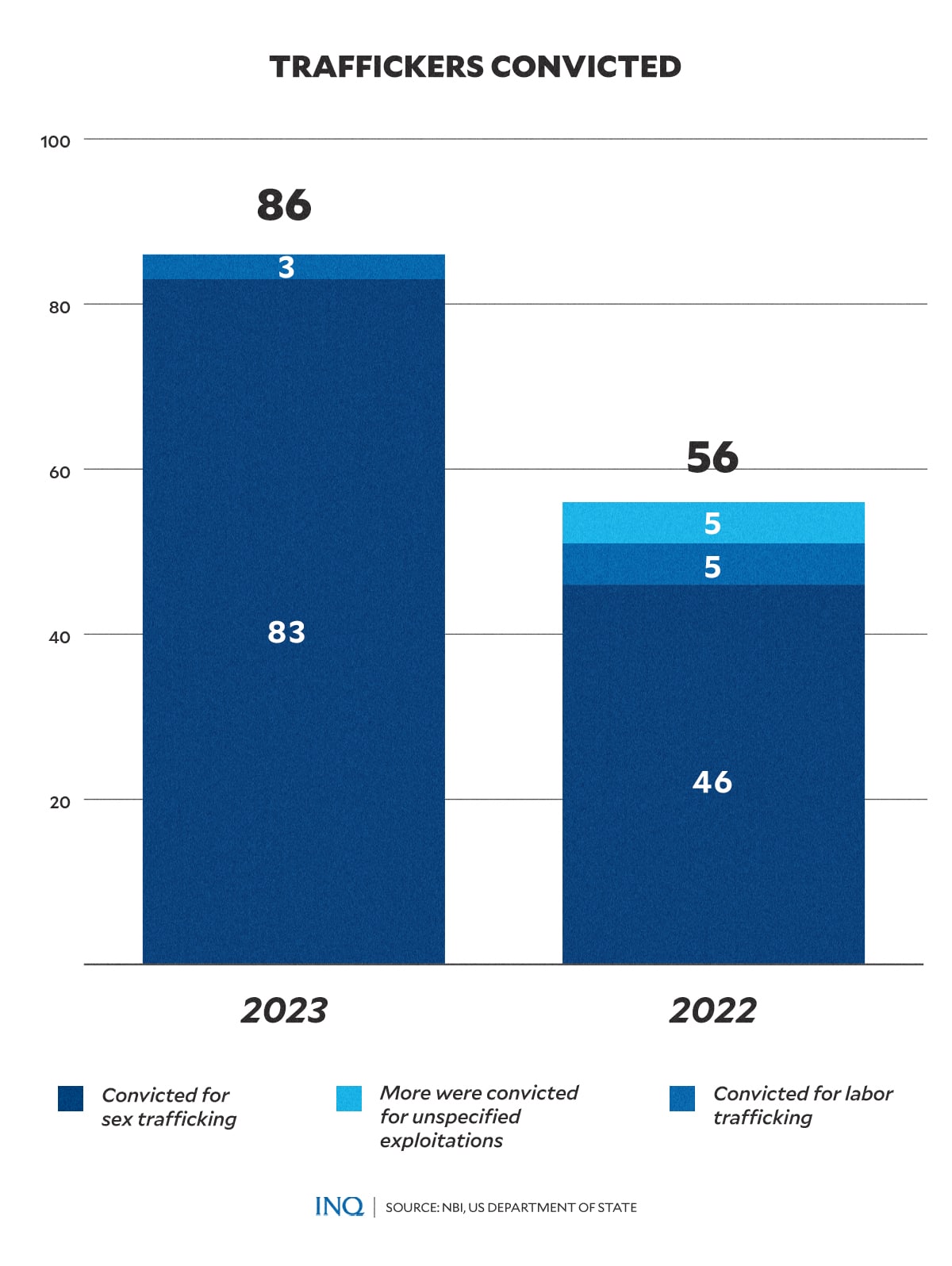Qualified trafficking vs Apollo Quiboloy: Explainer
MANILA, Philippines—The most serious criminal case filed against Apollo Quiboloy was qualified human trafficking, a nonbailable offense.
Human trafficking, by itself, is already a very serious crime.
But according to the law, trafficking is even more severe when it is considered “qualified,” a nonbailable crime penalized by life imprisonment and a fine of not less than P2 million but not more than P5 million.
READ: TIMELINE: From Senate probe, filing of cases, to Quiboloy’s arrest
As the Philippine Commission on Women (PCW) explained, human trafficking is considered as qualified when:
Article continues after this advertisement- The trafficked person is a child.
- There is adoption under RA No. 8043, or the Inter-Country Adoption Act, and adoption is for the purpose of prostitution, pornography, sexual exploitation, forced labor, slavery, involuntary servitude or debt bondage;
- The crime is committed by a syndicate or is large scale.
- The offender is a spouse, ascendant, parent, sibling, guardian or a person who exercises authority over the trafficked person.
- The offense is committed by a public official or employee.
- The trafficked person is recruited to engage in prostitution with any member of the military or law enforcement agencies.
- The offender is a member of the military or law enforcement agencies.
- The trafficked person died, became insane, suffered mutilation, or got infected with HIV/AIDS.
- The offender commits one or more acts of TIP over a period of 60 or more days
- The offender directs or through another manages the trafficking victim.
The arrest of Quiboloy on Sunday, September 8, brought focus to the battle against exploitation, especially of women and children, in a country where human trafficking is pervasive.
Article continues after this advertisementREAD: Apollo Quiboloy has been arrested – DILG chief Abalos
As Manila Rep. Bienvenido Abante Jr. pointed out, the crimes Quiboloy is accused of are “monstrous” and “no amount of power or influence can shield him from the full force of the law.”
“The time for reckoning has come,” he said.
Quiboloy was arrested a few weeks after police started searching the compound of the Kingdom of Jesus Christ (KJC) in Davao City to serve the arrest warrant issued against him for these charges:
- Violation of RA No. 7610, or the Special Protection of Children Against Abuse, Exploitation and Discrimination Act
- Violation of RA No. 9208, or the Anti-Trafficking in Persons Act
The arrest warrant for Quiboloy and his five co-accused for violating the law prohibiting child abuse was issued by the Davao City Regional Trial Court (RTC) Branch 12 on April 1.
READ: DOJ orders multiple raps to be filed vs Quiboloy
Less than two weeks later, the Pasig City RTC Branch 159 also ordered the arrest of Quiboloy and his co-accused for violating the law against human trafficking, a nonbailable offense.
The cases against Quiboloy were filed in March after the Department of Justice granted the petition for review filed by a female victim to seek the reversal of the dismissal of her complaint by the Davao City Prosecutor’s Office in 2020.
Trafficking in PH
As The Exodus Road, an anti-human trafficking NGO, pointed out, human trafficking is the second-largest “criminal enterprise” in the world, after narcotics, and in the Philippines, human trafficking is a “considerable concern.”
“It has one of the largest victim populations in the world with an estimated 784,000 people living as modern-day slaves,” it said, with indigenous people, internally displaced persons, women, and children considered most at-risk.
The Philippines has a law against human trafficking—RA No. 9208, which was enacted in 2003 and amended in 2012 by RA No. 10364, or the Expanded Anti-Trafficking in Persons Act.
As the PCW explained, trafficking in persons is a crime that violates human rights and is committed through interdependent and related elements:
- acts, which involve the recruitment, obtaining, hiring, providing, offering, transportation, transfer, maintaining, harboring, or receipt of persons with or without the victim’s consent or knowledge, within or across national borders;
- means, which are committed by use of threat, or use of force, or other forms or coercion, abduction, fraud, deception, abuse of power or of position, taking advantage of the vulnerability of the person, or the giving or receiving of payments or benefits to achieve the consent of a person having control over another person; and
- purpose, which is done for the purpose of exploitation or the prostitution of others or other forms of sexual exploitation, forced labor or services, slavery, involuntary servitude or the removal or sale of organs.
PCW stated that these are the crimes defined by RA No. 9208 as amended by RA No. 10364 and are penalized with 20 years imprisonment and a fine of not less than P1 million but not more than P2 million:
- to recruit, transport, transfer; harbor, provide, or receive a person by any means, including those done under the pretext of domestic or overseas employment or training or apprenticeship for illegal purposes
- to introduce or match for money, profit, or material, economic or other consideration, any person or any Filipino woman to a foreign national, for marriage for the purpose of acquiring, buying, offering, selling or trading him/her to engage in illegal activities
- to offer or contract marriage, real or simulated, for the purpose of acquiring, buying, offering, selling, or trading them to engage in illegal activities
- to undertake or organize tours and travel plans consisting of tourism packages or activities for the purpose of utilizing and offering persons for prostitution, pornography or sexual exploitation
- to maintain or hire a person to engage in prostitution or pornography
- to adopt or facilitate the adoption of persons for illegal purposes
- to recruit, hire, adopt, transport or abduct a person, by means of threat or use of force, fraud, deceit, violence, coercion, or intimidation for the purpose of removal or sale of organs of said person
- to recruit, transport or adopt a child to engage in armed activities in the Philippines or overseas
Pervasive
While there is substantial and ongoing progress in the fight against human trafficking in the Philippines, The Exodus Road stressed that “as the figures show, it remains a significant problem.”
Based on the US Department of State’s “Trafficking in Persons Report: Philippines,” there were 1,802 and 1,277 identified victims in 2022 and 2023, in the Philippines.
RELATED STORY: DOJ will follow due process in prosecuting Quiboloy – Remulla
Most were sex trafficking victims, with 535 in 2022 and 740 in 2023. Over 1,000 individuals were labor trafficking victims, while 766 more were victims of exploitations that were not specified.
The US Department of State said that the penalties prescribed for human trafficking are stringent enough and , with respect to sex trafficking, “commensurate with those prescribed for other serious crimes, such as rape.”
Close to 300 cases were investigated by the National Bureau of Investigation and the Philippine National Police in 2023, with 139 alleged traffickers prosecuted—115 sex trafficking cases and 24 labor trafficking cases.
Back in 2022, 168 human trafficking cases were investigated and 298 alleged traffickers prosecuted—224 sex trafficking cases and 62 labor trafficking cases. Twelve more were prosecuted for exploitations that were not specified.
Convictions, however, are lower at 86 in 2023 and 56 in 2022. Most, or 129, were convicted of sex trafficking in the past two years, while eight were convicted of labor trafficking.
Quiboloy, who was indicted in the US in 2021, was charged with violating Section 4 (a) of the law, which listed prostitution, pornography, sexual exploitation, forced labor, slavery, involuntary servitude, and debt bondage as illegal.
READ: Marcos: Let Quiboloy face PH cases first
The Philippines is considered a Tier 1 country by the US Department of State, indicating that it fully meets the minimum standards for the elimination of trafficking.


















